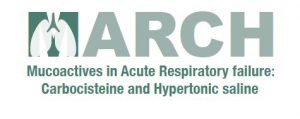| Trial Acronym | MARCH |
| Clinical Area | Critical Care |
| Trial Title | Mucoactives in Acute Respiratory failure: Carbocisteine and Hypertonic saline |
| Status | Follow up |
| Trial Registration | https://www.isrctn.com/ISRCTN17683568 |
-
Recruitment
Recruitment Target 1956 Date Open to Recruitment February 2022 Recruitment 1956 as of April 2025 Date Closed to Recruitment 30th April 2025 -
Trial Design
Trial Design A 2×2 factorial, randomised, controlled, open-label, Phase 3, pragmatic, clinical and cost effectiveness trial with internal pilot, to determine whether mucoactives (carbocisteine and hypertonic saline) in critically ill patients with acute respiratory failure (ARF) reduce duration of mechanical ventilation Study Aim Aim : To determine whether use of mucoactives in critically ill patients with acute respiratory failure improves outcomes and is cost effective, compared to usual airway clearance management Objectives : To conduct a large, UK, multi-centre, pragmatic, randomised controlled trial to:
1. Determine the clinical effectiveness of two mucoactives (carbocisteine or hypertonic saline), or a combination of both, on duration of mechanical ventilation (primary outcome), and a range of secondary clinical and safety outcomes
2. Estimate, in an integrated economic evaluation, the cost-effectiveness of the mucoactives -
Chief Investigator (CI)
Chief Investigator Professor Danny McAuley, Queen’s University Belfast Co-Chief Investigator Dr Bronwen Connolly, Queen’s University Belfast -
Sponsor(s) & Funder(s)
Sponsor Belfast Health and Social Care Trust Funder National Institute for Health and Care Research
Health Technology Assessment Programme; NIHR130454
www.fundingawards.nihr.ac.uk/award/NIHR130454 - Patient Information

